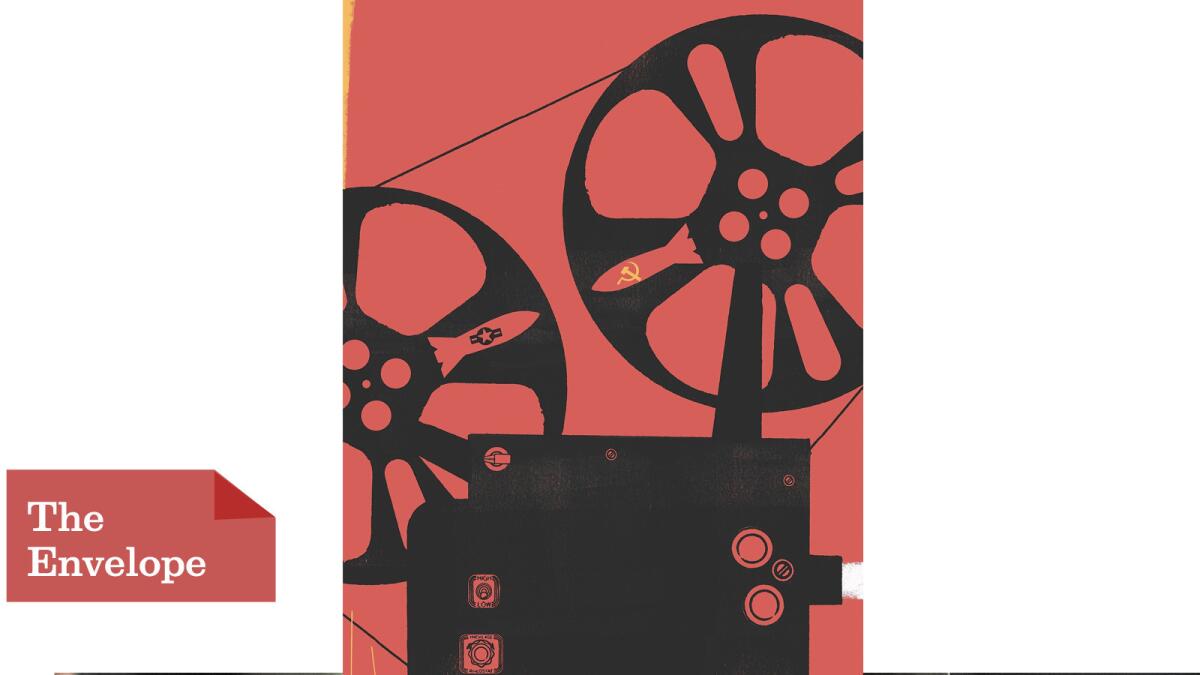The Envelope: Three new films show fascinating facets of the Cold War

Cold War movies traditionally pushed hot buttons and earned Oscar acclaim by tapping into collective anxiety over stakes that couldn’t get much higher: nuclear annihilation. “The Manchurian Candidate” (1962), best picture nominee “Dr. Strangelove” (1964) and “Tinker Tailor Soldier Spy” (2011) use fictional frameworks to dramatize the human cost of Anglo-American/Soviet friction; this fall, three thoughtful thrillers of sorts revisit the era with fact-based stories. “Bridge of Spies,” “Trumbo” and “Pawn Sacrifice” feature Tom Hanks, Bryan Cranston and Tobey Maguire, respectively, as real-life Americans of uncommon mettle.
SIGN UP for the free Indie Focus movies newsletter >>
“Bridge of Spies” follows Brooklyn insurance lawyer James Donovan, who first saves Russian spy Rudolf Abel (Mark Rylance) from execution, then negotiates a prisoner swap in Berlin for Gary Francis Powers after the American pilot’s U-2 spy plane crashes in 1960 on Soviet soil. Like director Steven Spielberg, whose scientist father saw fragments of the U-2 on display in Red Square during an early ‘60s visit to Moscow, “Bridge of Spies” producer Marc Platt grew up during the Cold War. “I remember looking out my window and watching a bulldozer pull into the yard next door to dig a big hole into which went a bomb shelter,” he says.
While the particulars of October’s “Bridge of Spies” speak to a unique period of American history, the film brims with contemporary themes. “The thing that resonated for us as we got into the story is that these fears that existed during the late ‘50s and early ‘60s are very much reflected in the world we’re living in today,” Platt says. “For example, James Donovan discovers the FBI conducted an illegal search and seizure on Abel, but that’s not recognized in the courts because national security is deemed to be more important. The form of terror may be different today, but whether you’re talking about Guantanamo or drones or wiretapping, you can look back at the Cold War and realize we’re dealing with the exact same thing, except back then, we were afraid of Russian spies.”
Around the same time that Hanks’ Donovan got vilified for defending a Soviet agent, left-leaning screenplay writer Dalton Trumbo, portrayed by Cranston in “Trumbo,” which opened earlier this month, was cranking out B-movie scripts under fake names because he’d been blacklisted in Hollywood for refusing to testify before Congress’ House Un-American Activities Committee. Director Jay Roach sees the saga of Trumbo and the Hollywood 10 as a cautionary tale about the collateral damage caused by fear-based politics.
“The Soviet threat was real, but the Cold War was a battle of ideas as much as it was an arms race,” Roach says. “On our side, you had people like gossip columnist Hedda Hopper spreading the notion that anyone affiliated with any left-wing organization might be un-American, and if you don’t talk about who you know and what organizations you may have belonged to, then you’re most likely a traitor. That was a bad idea. A lot of people lost their jobs and suffered tremendously because it caught on.”
Unable to claim trophies for the Oscar-winning “Roman Holiday” and “The Brave One” screenplays he wrote under other names, Trumbo finally triumphed over blacklist zealots in 1960 when producer-star Kirk Douglas insisted on crediting him as author of “Spartacus.” “When Helen Mirren as Hedda Hopper hears that President Kennedy likes ‘Spartacus,’ it’s as if someone poured water on the Wicked Witch and she melts before your very eyes,” Roach says. “Trumbo’s superpower was this ability to write, to tap into the truth, to inspire people with the shared human experience. That’s the mythological aspect of the story: Trumbo used words — the very thing he was forbidden to use — to undo this delusion and break this mass hypnosis spell.”
A decade after the blacklist vaporized, the Cold War took an unexpected turn in the person of Bobby Fischer. As chronicled in the September release “Pawn Sacrifice,” the eccentric Brooklyn chess genius (played by Maguire) generated national hysteria in summer 1972 by beating Russian world champion Boris Spassky (Liev Schreiber) in Reykjavík, Iceland. Fischer thrilled U.S. viewers of the globally telecast matches with his pugnacious demands and astonishing skill.
“Bobby was perfectly happy to become this sort of gladiator for American ideology, but I don’t think the geopolitical realm mattered to him that much one way or the other,” says director Edward Zwick. “However, he did have a real beef against the Russians because Bobby believed they swindled him out of his championship and didn’t play by the rules.”
“Pawn Sacrifice” hints that Fischer’s obsession with beating the Russians may have been financially supported by the White House. Zwick says, “I didn’t feel comfortable stating that the CIA funded Fischer, because I can’t corroborate that, but it is true that Henry Kissinger called him on the phone. I think it’s fair to assume this chess match was understood to be important in the corridors of power.”
More to Read
From the Oscars to the Emmys.
Get the Envelope newsletter for exclusive awards season coverage, behind-the-scenes stories from the Envelope podcast and columnist Glenn Whipp’s must-read analysis.
You may occasionally receive promotional content from the Los Angeles Times.






